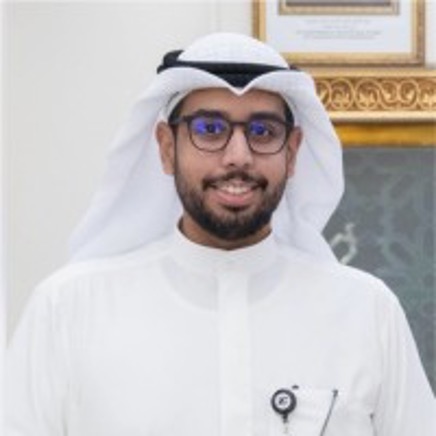by Kamila Kinyon
This Spring we will be publishing a series of spotlight articles about multilingual students and faculty at DU. These articles are based on interviews that Dr. Kamila Kinyon and a group of multilingual students conducted about interviewees’ lived experiences, including continuing connection to heritage languages, role as writers and teachers at DU, and thoughts about multilingual and multicultural identity. This project is funded by a Faculty Research Fund Grant awarded to Dr. Kinyon for 2023-25. We welcome this opportunity to celebrate DU’s multilingual community.
An accomplished linguist and interpreter from Kuwait, Abdulaziz Al-Maosherji is currently a graduate student in DU’s MFJS program. Sponsored through a full-ride scholarship, Abdulaziz will have a guaranteed position at the prestigious Kuwait University once he finishes his graduate studies in the United States. In an exclusive interview, Abdulaziz discussed the role that multilingualism has played in his life and work.
Abdulaziz has been fluent in Arabic and English since childhood, and he is versed in multiple dialects of Arabic. He grew up speaking Kuwaiti Arabic, a dialect that incorporates borrowed words from English. After completing his undergraduate education, his combined interests in linguistics and politics motivated him to seek a position as a political interpreter, and he successfully worked in this field for over seven years before moving into academia: “I was the official interpreter for all Arabic speaking nations in the Interparliamentary Union and the Association of Secretaries, General of Parliaments. I had to do simultaneous interpreting, consecutive interpreting, and whisper interpreting to the delegations that went to these events, and I had to do them in both ways. So Arabic to English as well as English to Arabic.” Abdulaziz notes that translating from English to Arabic takes special skill since “Arabic has a lot of flowery language (and) a different kind of structure. That kind of follows a person’s stature, like the higher they are, the more high language you need to use.”
An accomplished author, Abdulaziz has written articles for a major Kuwaiti newspaper, has published four books, and is working on two more. “The most notable is a political thesaurus, a guidebook for interpreters and translators. It’s a specialized kind of dictionary meant for political uses. It’s distributed in a way that is easy to use for simultaneous interpreters.” In addition to this political thesaurus, Abdulaziz wrote “a textbook on how one can work in political translation and interpreting” which was published by Cambridge Scholars in the UK. Attesting to his versatility as a writer, Abdulaziz also published a novel shortly after graduating from college which is “primarily in English, but has some French, some Italian, and Latin.”
Current writing projects include his thesis, finalizing the minutes of the Constituent National Assembly, and “working on a new dictionary that’s specifically looking at foreign words within the dialect of Kuwaiti Arabic.” His thesis uses sentimental analysis methods to analyze campaigns used by candidates for the National Assembly of Kuwait. To study the discourse of these campaigns, Abdulaziz first needs to “transcribe their campaigns, translate them and then analyze them.”
Abdulaziz feels that the University of Denver offers good support for multilingual students, and professors he has worked with create a happy balance by combining challenging material with reasonable expectations. “The writing center was definitely a treasure… Coming in Research Center as well is definitely massive for grad students. I love how the University of Denver is inclusive. I love how much support you get by the professors. So yeah, I’m in my second quarter and honestly, I feel like home.” Inspired by his professors’ approaches, Abdulaziz plans to implement some of their methods in his own teaching.
Once he finishes his studies in the U.S., Abdulaziz welcomes the prospect of returning to Kuwait to work at its central university: “My scholarship is a full ride for MA and PhD and a job guarantee. So upon completion of study you go back to Kuwait where you become a faculty member and assistant professor at Kuwait University. And yeah, that’s been my dream for more than I can remember.”
Recognizing that multilingual students often have worries about assimilation or acceptance, Abdulaziz has this final important message: “Just put yourself out there. Have an open mind. Open yourself up to new experiences, and allow different people in your life, and you’ll have a lot of friends, and achieve a lot of growth.”

